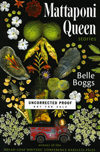Mattaponi Queen
In one of the many aching, tender scenes in Mattaponi Queen, a woman goes to Wal-Mart with her husband, who is dressed in drag. He’s about to have a sex change operation and the public shopping expedition is her way to support and process his decision. Later, she wonders: “How old do you have to be to understand how love works?”
In one of the many aching, tender scenes in Mattaponi Queen, a woman goes to Wal-Mart with her husband, who is dressed in drag. He’s about to have a sex change operation and the public shopping expedition is her way to support and process his decision. Later, she wonders: “How old do you have to be to understand how love works?”
The question haunts all the characters in Mattaponi Queen, a debut collection of short stories that won the Bread Loaf Writers’ Conference Bakeless Prize. Set near and on the Mattaponi Indian Reservation in Virginia, the twelve tales mull the many manifestations of loneliness and the ache for companionship.
Nearly every story in Mattaponi Queen explores the effects of estrangement. Husbands and wives, parents and children stumble through their daily routines, haunted by people separated from them by distance, divorce, or death. Many characters have jobs – such as nurse, teacher and coach – that require them to care for others. Meanwhile, they undermine their own chances at happiness, whether it’s through drugs and alcohol or self-imposed seclusion.
The book begins slowly, with stories that are nearly vignettes. Gradually, a narrative accrues as Boggs sketches her native state from multiple points of view: male and female, young and old, black, white, and Indian. The tension comes to a head with “Homecoming,” about a boy who moves from Brooklyn to Virginia and his transformation from football star to drug dealer. At 40 pages, it’s the longest piece in the collection and, plot-wise, the most traditional. Regardless, the story hammers home the themes of the collection: the clashes between dreams and reality and the fault-lines of race and class in America. Above all, the story addresses the notion of what it means to belong to a community and call a place home. Mattaponi Queen is filled with homecomings and the celebrations are always bittersweet.
While characters recur in some stories, the unifying thread is the setting, a slice of semi-rural Virginia that speaks to a dying way of life. Minor characters may escape – to Hollywood or the swanky suburbs – but the protagonists have either chosen to stay or are forced by circumstance to come home. In “Good News for a Hard Time,” Ronnie, a half-Indian college dropout, returns after a long absence:
The airs she put on at school. You would have thought she lived in a teepee village, but really the reservation was just like anywhere else, trailers and double-wides and clapboard ranchers set on weedy lawns far off the black asphalt road. Pickup trucks with expired license plates. Girls who wore tight jeans and hairspray. It wasn’t exotic or special, just a big bunch of acres on the river. But the river was beautiful, even a mere silvery glimpse of it here and there through the thick growth of trees.
A similar air of ambivalence about home recurs throughout the collection. In “Imperial Chrysanthemum,” an elderly nurse muses:
It used to depress me to think about being born so close by – the idea, I guess, was that I hadn’t gotten anywhere – but now I don’t mind as much. I’m able to see what has changed and what has been the same, even if those are not all good things. Somehow it’s a satisfying feeling, like staying to the end of a party to make sure you don’t miss anything.
Elsewhere, the nurse aspires to be as “neutral and regal” as a boxwood tree, a phrase that captures the tone of Mattaponi Queen. The prose reflects the characters’ muted stoicism, a stance that masks their suffering. Dramatic action rarely occurs in the present; instead, the characters obsess about pain from the past and dream about lives they could have led. Instead of dramatic climaxes and tidy epiphanies, most of the stories hinge on awkward anticlimaxes and end with uncertain resolutions.
Domestic fiction often focuses on heartbreaks and disappointment within families and Mattaponi Queen is no exception. What sets the book apart is the sense of history that bubbles beneath the surface. Four hundred years ago Powhatan – chief of the Mattaponi and the father of Pocahontas – ruled the region where these stories take place. Then John Smith married his daughter and English colonists kicked off an era of violence that ultimately led to the genocide of Native Americans and the founding of the United States. As these stories attest, we are still feeling the repercussions.





